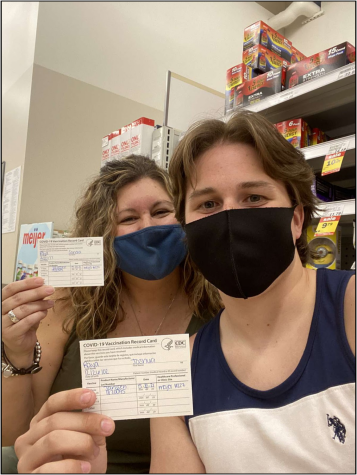Should you Get the J and J Vaccine?
May 25, 2021
Within the past month, many states are now allowing those over 16-year-olds to get the Pfizer COVID-19 vaccine, which has made many of the students at Milford High School decide to get vaccinated. Health experts believe that as we have nearly 70 percent of the population with immunity to the virus, fewer people will become sick and hopefully, normalcy will follow. While many students are not old enough to get the Johnson and Johnson vaccine, in which the age limit is still currently 18, experts believed it was an important tool to get more people vaccinated with limited doses of Moderna and Pfizer available. However, on April 13th, the Johnson and Johnson vaccine was paused from being administered after six cases were reported in which women had died from blood clots after they had received the vaccine.
However, according to the CDC as of April 12th, 6.8 million doses of the vaccine have been administered in the U.S already.
While every death or health effect that occurs is a tragedy,, compared to some other medications that women use in everyday life, there is a much lower ratio of deaths due to blood clots from reactions to the vaccine.
Senior Luke Ballard had received the Johnson and Johnson vaccine just a week before the vaccine got pulled. “ I would definitely say that it is safe for the general public as long as people are aware if they have risks.” Ballard Said “ I personally would still get this vaccine over others. It made it a lot easier since it was one dose and I’m sure with how crazy things have been people would want the less time consuming option. Especially so we can get back to some sort of normalcy soon.”
Peyton Hall, a Graduate from Milford’s 2020 class, got the vaccine on April 12th, the day before it was pulled. She doesn’t have many worries about the vaccine, even with how it is affecting some women. “At first, I was concerned when the day after I got the J and J vaccine, it got pulled,” she said. “But I did my research, and it turns out that only six out one million women died from blood clots after the vaccine, but one out one three hundred women die from blood clots from being on birth control.”
Hall even went as far as saying, “I feel that the vaccine should be available to anyone unless it is said by a doctor that they would be at greater risk from getting the vaccine.” Hall was correct because only a little over a week after the vaccine was paused, on April 23rd, the CDC and FDA gave guidelines that women under 50 should be aware that the vaccine could cause a rare risk of blood clots.
This is amazing news, because the Johnson and Johnson vaccine is important for many reasons. One: it doesn’t need to be kept at the temperatures that the Moderna and Pfizer vaccines are kept at, so more places can hold the vaccine without the special containment units that are needed. This means that a lot more rural locations especially will be able to administer the vaccine, and in higher numbers.
Also, at this time, we need to get as many COVID vaccines out as possible. “We’ve never had to vaccinate our whole population at the same time before — not to mention the rest of the world — so having more vaccines will make that easier,” said Jean Jaques in a NBC article by Denise Chow. Jaques is an assistant professor of medicine at Northwestern University and her thoughts about the vaccine are very clear.
While there has been a lot of worry about the vaccine the past few weeks, what has been made certain is that if you have the ability to receive a COVID vaccine, it is very important–no matter what vaccine–that you get it. The chances of dying from Covid are much higher from dying from the vaccine. Around 588,000 have died from Covid in the US alone while only six have died from the vaccine. All of the three vaccines have been proven to be safe as long as the right precautions are taken. Get the vaccine to keep everyone safe and so that we can get back to normal soon.
